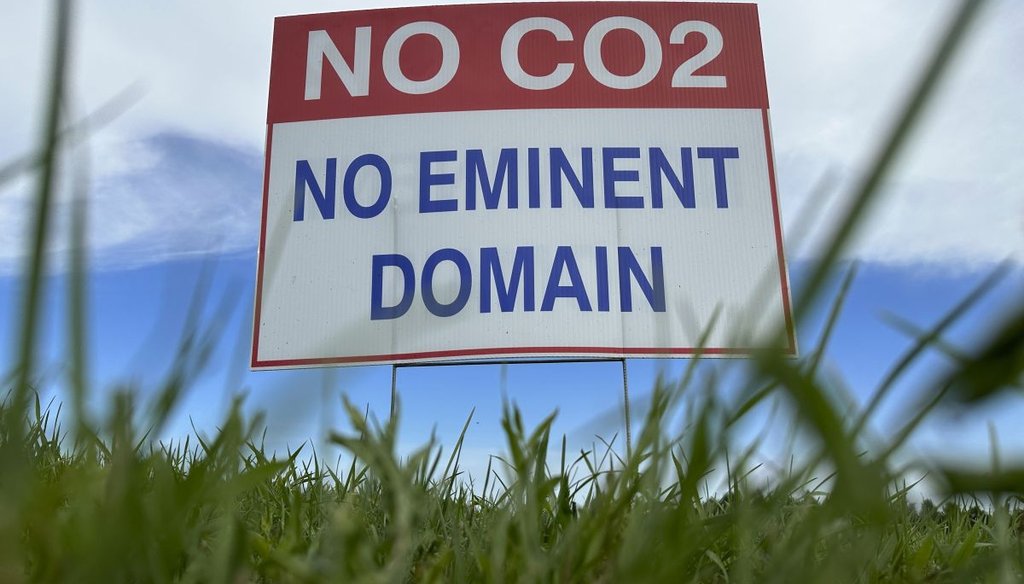Get PolitiFact in your inbox.

A sign stands along a rural road east of Bismarck, N.D., protesting a proposed carbon dioxide pipeline like one proposed in Iowa. (AP)
In campaign stops, Republican presidential candidate Vivek Ramaswamy has been railing against the government using eminent domain to build carbon capture pipelines on private land.
Ramaswamy incorporated the topic into his stump speech in Iowa, an agricultural state and the first to vote in the primary season, and at the fourth Republican presidential debate in Tuscaloosa, Alabama.
"There's an issue coming up in Iowa. It's core to Iowa farmers," Ramaswamy said at the Dec. 6 debate. He said he’s met Iowa farmers "who are about to have a carbon capture pipeline built across their land using eminent domain to do it. That's unconstitutional and it's wrong."
Carbon capture pipelines are intended to curb climate change by capturing and storing carbon dioxide, a powerful greenhouse gas, deep underground so it doesn’t add to rising atmospheric temperatures.
Ramaswamy was referring to a five-state pipeline system proposed by Summit Carbon Solutions that would carry captured carbon dioxide from about 30 ethanol plants to North Dakota. Under the proposal, about 700 miles of pipe would be laid in Iowa.
Sign up for PolitiFact texts
Eminent domain is a legal concept that lets the government seize or gain access to private property for public use as long as the owner is compensated. Traditionally, the government has used eminent domain to build schools, roads and infrastructure.
However, CO2 pipelines are a relatively new type of infrastructure, and using eminent domain to build them hasn’t been widely tested in U.S. courts. In Iowa, CO2 pipeline projects have sparked legislative fights and legal battles.
Given the legal uncertainties, we won’t offer a Truth-O-Meter rating on Ramaswamy’s remark.
When PolitiFact asked Ramaswamy’s campaign for evidence that the practice is unconstitutional, campaign staff pointed to his Dec. 2 speech in Des Moines, Iowa, when he said that Iowa law specifies that CO2 pipelines can be granted eminent domain only if they have a public use and are "convenient and necessary." He cited Iowa statute 479B, which outlines when eminent domain can be used to build hazardous liquid pipelines, including CO2 pipelines.
"Is this a public use? No, it is not. These are private companies being showered, billions of dollars of U.S. taxpayer money upon them. Those are companies, not the state," Ramaswamy said in the speech. He added that he thought the Summit Carbon Solutions multistate project was neither convenient nor necessary.
In 2005, the U.S. Supreme Court ruled 5-4 in Kelo v. New London that eminent domain could also be used for private developmen. That could cover the proposed carbon capture pipelines.
Constitutional and environmental law experts expressed doubt that using eminent domain to build a carbon dioxide pipeline is clearly unconstitutional.
"Whether it is constitutional in this case depends on various factors, such as who will own the pipeline, and who will be allowed to use it," said Ilya Somin, a George Mason University law professor who has written about eminent domain.
States can decide which projects are considered a "public use" and are therefore eligible for the use of eminent domain. Some states, such as Iowa, include CO2 pipelines in their statutes; other states grant the permits only for oil and gas pipelines, electric transmission lines and water pipelines.
"Certainly, advocates who oppose eminent domain for any type of pipeline would argue any statute granting eminent domain for them is unconstitutional," said Alexandra Klass, a University of Michigan law professor. "But so far there's no Iowa court that has held that."
Klass said Iowa law currently allows for using eminent domain to build CO2 pipelines with appropriate permits, and neither the Iowa Supreme Court nor the U.S. Supreme Court has held that using eminent domain in these circumstances is unconstitutional.
Efforts in the Iowa Legislature to eliminate eminent domain for CO2 pipelines have not succeeded, either, though proponents have said they will introduce similar legislation in 2024.
"These are arguments being made in Iowa and in other states," Klass said. "But the courts haven't yet decided the issue, so it's not a foregone conclusion that courts would accept such an argument."
One proposed project that involves Iowa, from Nebraska-based Navigator CO2 Ventures, was canceled in October, with the company citing "unpredictable" state regulatory processes.
What are carbon capture pipelines?
The pipelines aim to reduce greenhouse gas emissions, such as those created during the manufacture of ethanol, fertilizer and other industrial agriculture products, all significant industries in Iowa. The system captures carbon dioxide and compresses it into liquid form for transport.
By the end of 2022, the United States had about 5,380 miles of CO2 pipelines. That’s far less than U.S. oil and gas pipelines, which run for about 230,000 miles.
Two federal laws, the 2018 Bipartisan Budget Act and the 2021 Storing CO2 and Lowering Emissions Act, or SCALE Act, provided tax credits for carbon captured and stored, and low-interest loans and grants to support pipeline construction. President Joe Biden’s administration said in August it would allocate up to $1.2 billion on carbon capture projects in Texas and Louisiana.
All pipelines carry risk, but because CO2 pipelines are a newer technology and operate at a high pressure, some pipeline safety regulators say federal safety standards aren’t strong enough to mitigate the pipelines’ risks.
Some landowners and environmentalists have resisted CO2 pipeline projects, wary of leaks and water contamination. In 2020, a CO2 pipeline ruptured in Mississippi, sickening dozens of residents.
Iowans have criticized CO2 pipeline proposals in their state, and public hearings about the projects have often lasted for weeks, the Des Moines Register reported in November. A March 2023 poll found that nearly 80% of Iowans oppose using eminent domain to build carbon pipelines.
Eminent domain attorneys, such as Justin Hodge, a Texas lawyer who represents landowners, said that although pipelines might be needed infrastructure, they often come at landowners’ expense.
Landowners are terrified and have to deal with "very sophisticated companies with legal teams," Hodge said. "Most just sign the paperwork, which is a terrible thing."
The constitutionality of using eminent domain for CO2 pipelines
The U.S. Constitution's Fifth Amendment includes the "takings clause," that says private property cannot be taken for public use "without just compensation." But the clause doesn’t prohibit the U.S. government, or a company designated by the government, from acquiring the property.
Richard Collins, a University of Colorado emeritus professor of constitutional and property law, said it’s unlikely that infrastructure such as pipelines, highways and roadways could be built without eminent domain. "An absolute statement that it would be unconstitutional to build such a pipeline would be wrong — unless the Supreme Court changes the rule."
A company or government that wants access to property via eminent domain must have "clear legislative authority to do so," Collins said. In Iowa, that authority lies with the Iowa Utilities Board, which regulates utility infrastructure related to pipelines and electric transmission lines.
The board determines which projects are granted eminent domain. Those decisions can be challenged in court, but experts said Iowa law is relatively clear that once a permit is approved, pipeline companies can legally use eminent domain to move forward.
In 2019, the Iowa Supreme Court found that using eminent domain to construct the Dakota Access oil pipeline wasn’t unconstitutional under the Iowa or U.S. constitutions. The court said the Iowa Utilities Board acted within its discretion in determining that the pipeline would promote "public convenience and necessity." The court authorized the utilities board to interpret that standard’s meaning and decide which projects fit the description.
The court reviewed the board’s decision only to ensure that it wasn’t "irrational, illogical, or wholly unjustifiable." The utilities board is expected to issue a decision in 2024 on Summit Carbon Solutions’ CO2 pipeline project.
"There may be arguments to treat CO2 pipelines differently (than other pipelines), but it would be an uphill battle," Klass said.
Our Sources
NBC News, Vivek Ramaswamy leans into a contentious issue in Iowa in a late bid for traction, Dec. 5, 2023
Des Moines Register, Vivek Ramaswamy challenges Gov. Kim Reynolds, GOP on Iowa carbon capture pipelines, Nov. 30, 2023
Des Moines Register, Lawmakers look to curb eminent domain powers for carbon capture pipeline builders, Jan. 28, 2023
YouTube, Vivek Ramaswamy: Speaking the unspeakable about CO2 pipelines and the climate change agenda, Dec. 2, 2023
Justia, Kelo v. New London, Accessed Dec. 14, 2023
Iowa Capital Dispatch, Summit permit decision in Iowa not expected until next year, Nov. 9, 2023
Iowa Capital Dispatch, Feds: Carbon dioxide pipelines are necessary to reduce emissions, May 31, 2023
U.S. Department of Energy, Biden-Harris Administration Announces Up To $1.2 Billion For Nation’s First Direct Air Capture Demonstrations in Texas and Louisiana, Aug. 11, 2023
Pipeline Safety Trust, Accufacts’ Perspectives on the State of Federal Carbon Dioxide Transmission Pipeline Safety Regulations as it Relates to Carbon Capture, Utilization, and Sequestration within the U.S., March 23, 2022
Scientific American, Pipelines Touted as Carbon Capture Solution Spark Uncertainty and Opposition, Oct. 1, 2023
Science Direct, Puncture Failure Size Probability Distribution for CO2 Pipelines, May 2023
Iowa.gov, Constitution of the state of Iowa, Accessed Dec. 8, 20234
Iowa.gov, Chapter 479B Hazardous liquid pipelines and storage facilities, accessed Dec. 8, 2023
U.S. Justice Department, History of the federal use of eminent domain, Updated Sept. 11, 2023
U.S. Justice Department Environmental and Natural Resources Division, Fifth Amendment takings law, Accessed Dec. 8, 2023
Iowa State University, Iowa Supreme Court says condemnation of farmland for Dakota Access Pipeline was constitutional, May 31, 2019
Iowa Public Radio, Bill to limit eminent domain for carbon pipelines dies in Iowa Senate, March 30, 2023
Nebraska Examiner, Unusual alliances emerge amid opposition to eminent domain for carbon pipelines, July 10, 2023
Successful Farming, Eminent domain concerns cloud pipeline proposals, Sept. 5, 2022
Stateline.org, New Midwest battles brew over CO2 pipelines, June 13, 2023
Iowa Utilities Board, Frequently asked questions about eminent domain, Updated September 2021
Email interview, Alexandra Klass, James G. Degnan Professor of Law at the University of Michigan, Dec. 8-14, 2023
Phone interview, Richard Collins emeritus professor of constitutional and property law at the University of Colorado, Dec. 8, 2023
Email interview, Donald Tormey director of communications for the Iowa Utilities Board, Dec. 14-15, 2023
Email interview, Ilya Somin professor of law at George Mason University and the B. Kenneth Simon Chair in Constitutional Studies at the Cato Institute, Dec. 10, 2023
Phone interview, Justin Hodge eminent domain lawyer at Marrs Ellis & Hodge LLP, Dec. 14, 2023

































